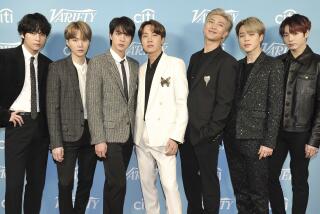Book a Date With Your Kids
If you want your kids to be readers, do what Jeanne Egasse does: Read, read, read to them.
“I was worried that I would have a hard time getting the attention of these TV Nintendo-generation kids,” said the 45-year-old Tustin mom, who started reading to her boys before she stopped nursing them. With a home library of about 800 children’s books, Egasse added, “but now, if I get them a book, I can keep their attention.”
Now her sons, ages 8 and 11, don’t care to watch more than an hour of television a week. Instead, they prefer to have their parents read them poetry, Civil War stories and chapters of “Huckleberry Finn.”
Egasse is following the advice of Jim Trelease, a former journalist turned reading guru, who wrote “The Read-Aloud Handbook.” Now he travels the country as a motivational speaker to parents.
Amid the swirling controversies over phonics and whole language, Trelease reminds parents that they have a crucial role in their children’s learning development.
“Reading is the most important subject because all the other subjects rest upon it,” Trelease said in a recent interview. “Parents need to recognize this and make the time for their children.”
Don’t allow your child’s first encounter with meaningful print to be at school, Trelease begs. This makes reading a chore, rather than a pleasure.
He urges parents to be dramatic when they read, giving emotion to the words. In this way, reading also nourishes children’s emotional development, encourages compassion, and introduces gestures and nuances of the English language not transmitted through TV. And in general, it introduces them to better language usage.
Here are more suggestions from parents and experts:
* Read to and for yourself as well. Let your children see that you enjoy and value books.
* Talk frequently to newborns. Infant brains develop rapidly and exposure to sounds and pictures help them pick up language early on. Mother Goose tales work well because of the rhymes and singsong rhythm.
* For 6- to 12-month-old children, choose cardboard picture books. Let the child touch, turn and even nibble on the pages.
* When reading to toddlers, point to objects and ask questions to engage them. The first time you read a book, discuss the illustrations on the cover. “What do you think this is going to be about?” “What do you think will happen next?”
* Lift-the-flap books tempt preschoolers and kindergartners and help them get more interested in the book as they guess what’s under the flap before lifting it.
* Adjust the pace of your voice to fit the story. Reading slowly enough allows the child to build mental pictures of what’s being read.
* Get your preschooler a library card. They enjoy the feeling of adult power and responsibility that comes with having their own card for taking out books.
* Consider a children’s magazine subscription for young children, or for older children, a magazine about a particular interest of theirs. They’re excited about receiving mail, and the magazines often have shorter features that help draw them into reading.
* Take your children to story times at libraries and local bookstores. Many bookstores also offer special children’s activities at certain times, such as arts and crafts. Let your child enjoy being in a book-filled environment.
* For older children who find books boring, especially classic literature, rent the video versions of some good books and have the book lying around ready to read. Once youngsters see that the story has drama and action, they often find the book more interesting and find it easier to get through the more passive, descriptive passages.
(BEGIN TEXT OF INFOBOX / INFOGRAPHIC)
Recommended Books
Preschool and primary grades
* “Chester’s Way,” by Kevin Henkes
* “Corduroy,” by Don Freeman
* “Frederick,” by Leo Lionni
* “Grandma’s Secret,” by Paulette Bourgeois
* “Jumbo the Boy and Arnold the Elephant,” by Dan Greenberg
Upper Elementary
* “The Wretched Stone,” by Chris Van Allsburg
* “The Bears’ House,” by Marilyn Sachs
* “Four Miles to Pinecone,” by Jon Hassler
* “Terror in the Towers,” by Adrian Kerson
* “Humbug Mountain,” by Sid Fleischman
Middle School and up
* “Miracle At Clement’s Pond,” by Patricia Pendergraft
* “Nothing But the Truth: A Documentary Novel,” by Avi
* “Incident at Hawk’s Hill,” by Allan W. Eckert
* “Killing Mr. Griffin,” by Lois Duncan
* “Maniac Magee,” by Jerry Spinelli
More to Read
Sign up for our Book Club newsletter
Get the latest news, events and more from the Los Angeles Times Book Club, and help us get L.A. reading and talking.
You may occasionally receive promotional content from the Los Angeles Times.






